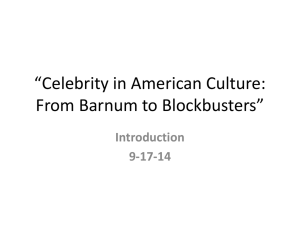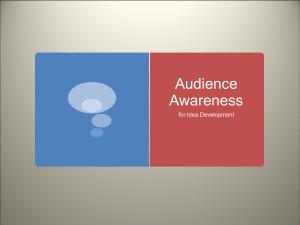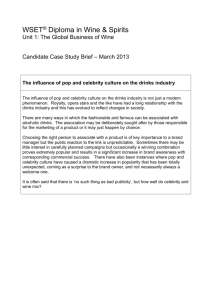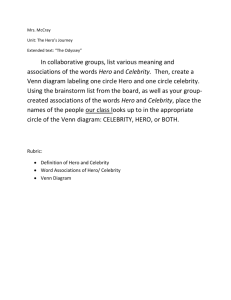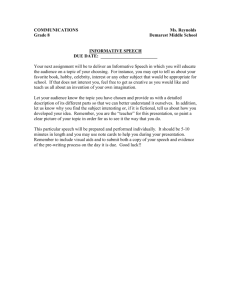PDF - International Journal Of Development Research
advertisement
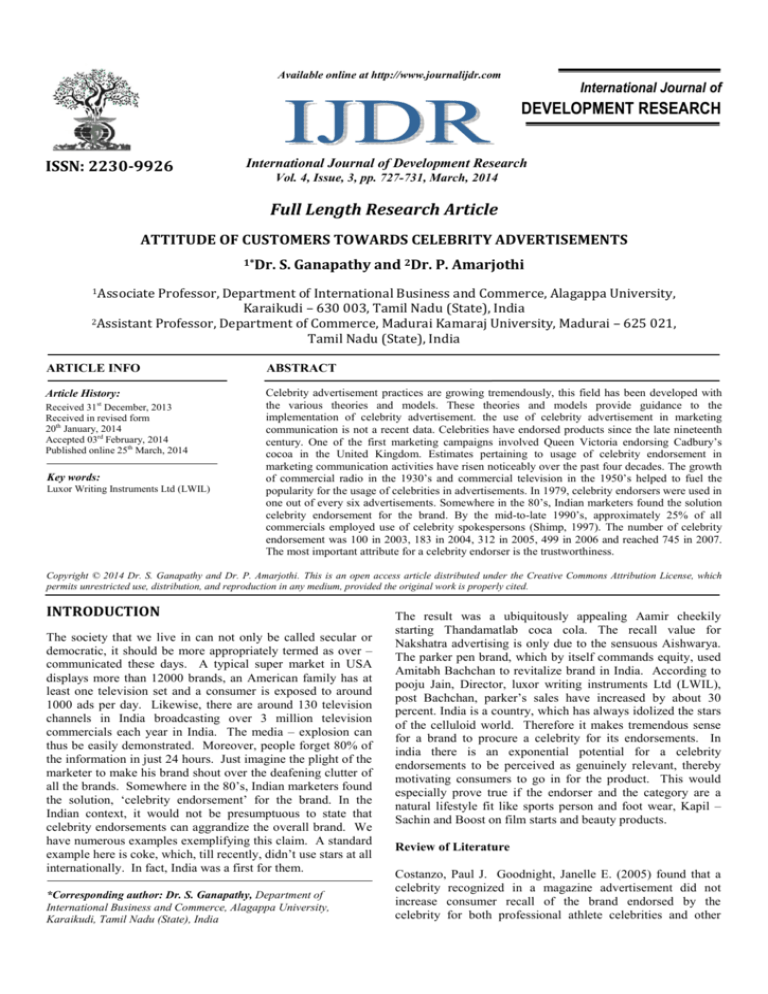
Available online at http://www.journalijdr.com International Journal of DEVELOPMENT RESEARCH ISSN: 2230-9926 International Journal of Development Research Vol. 4, Issue, 3, pp. 727-731, March, 2014 Full Length Research Article ATTITUDE OF CUSTOMERS TOWARDS CELEBRITY ADVERTISEMENTS 1*Dr. S. Ganapathy and 2Dr. P. Amarjothi 1Associate Professor, Department of International Business and Commerce, Alagappa University, Karaikudi – 630 003, Tamil Nadu (State), India 2Assistant Professor, Department of Commerce, Madurai Kamaraj University, Madurai – 625 021, Tamil Nadu (State), India ARTICLE INFO ABSTRACT Article History: Celebrity advertisement practices are growing tremendously, this field has been developed with the various theories and models. These theories and models provide guidance to the implementation of celebrity advertisement. the use of celebrity advertisement in marketing communication is not a recent data. Celebrities have endorsed products since the late nineteenth century. One of the first marketing campaigns involved Queen Victoria endorsing Cadbury’s cocoa in the United Kingdom. Estimates pertaining to usage of celebrity endorsement in marketing communication activities have risen noticeably over the past four decades. The growth of commercial radio in the 1930’s and commercial television in the 1950’s helped to fuel the popularity for the usage of celebrities in advertisements. In 1979, celebrity endorsers were used in one out of every six advertisements. Somewhere in the 80’s, Indian marketers found the solution celebrity endorsement for the brand. By the mid-to-late 1990’s, approximately 25% of all commercials employed use of celebrity spokespersons (Shimp, 1997). The number of celebrity endorsement was 100 in 2003, 183 in 2004, 312 in 2005, 499 in 2006 and reached 745 in 2007. The most important attribute for a celebrity endorser is the trustworthiness. Received 31st December, 2013 Received in revised form 20th January, 2014 Accepted 03rd February, 2014 Published online 25th March, 2014 Key words: Luxor Writing Instruments Ltd (LWIL) Copyright © 2014 Dr. S. Ganapathy and Dr. P. Amarjothi. This is an open access article distributed under the Creative Commons Attribution License, which permits unrestricted use, distribution, and reproduction in any medium, provided the original work is properly cited. INTRODUCTION The society that we live in can not only be called secular or democratic, it should be more appropriately termed as over – communicated these days. A typical super market in USA displays more than 12000 brands, an American family has at least one television set and a consumer is exposed to around 1000 ads per day. Likewise, there are around 130 television channels in India broadcasting over 3 million television commercials each year in India. The media – explosion can thus be easily demonstrated. Moreover, people forget 80% of the information in just 24 hours. Just imagine the plight of the marketer to make his brand shout over the deafening clutter of all the brands. Somewhere in the 80’s, Indian marketers found the solution, ‘celebrity endorsement’ for the brand. In the Indian context, it would not be presumptuous to state that celebrity endorsements can aggrandize the overall brand. We have numerous examples exemplifying this claim. A standard example here is coke, which, till recently, didn’t use stars at all internationally. In fact, India was a first for them. *Corresponding author: Dr. S. Ganapathy, Department of International Business and Commerce, Alagappa University, Karaikudi, Tamil Nadu (State), India The result was a ubiquitously appealing Aamir cheekily starting Thandamatlab coca cola. The recall value for Nakshatra advertising is only due to the sensuous Aishwarya. The parker pen brand, which by itself commands equity, used Amitabh Bachchan to revitalize brand in India. According to pooju Jain, Director, luxor writing instruments Ltd (LWIL), post Bachchan, parker’s sales have increased by about 30 percent. India is a country, which has always idolized the stars of the celluloid world. Therefore it makes tremendous sense for a brand to procure a celebrity for its endorsements. In india there is an exponential potential for a celebrity endorsements to be perceived as genuinely relevant, thereby motivating consumers to go in for the product. This would especially prove true if the endorser and the category are a natural lifestyle fit like sports person and foot wear, Kapil – Sachin and Boost on film starts and beauty products. Review of Literature Costanzo, Paul J. Goodnight, Janelle E. (2005) found that a celebrity recognized in a magazine advertisement did not increase consumer recall of the brand endorsed by the celebrity for both professional athlete celebrities and other 728 Dr. S. Ganapathy and Dr. P. Amarjothi, Attitude of customers towards celebrity advertisements entertainment celebrities who are not professional athletes. Furthermore, subjects in this study did not correctly identify the brand when previously exposed to the full magazine advertisement, even when the celebrity’s face cued the subject for recall. The results of this study raise questions relative to using celebrity endorsements to enhance brand recall1. RajniSurana (2008) he noted the differential influence of credibility of celebrity with the ‘celebrity enthusiast’ and the ‘product enthusiast’ Credibility of the celebrities as it appeared to be of utmost importance for the ‘celebrity enthusiast’ for influencing purchase decision, whereas on the other hand the ‘Product enthusiast’ gave the impression of being indifferent towards it. For them credibility of the celebrity endorsing the product was of no value. According to her study the ‘familiarity’ of the celebrity as an essential criterion for inducing a purchase of a celebrity endorsed product incorporated into the model. It demonstrates that endorser and corporate credibility have a symmetric relationship with the key variables associated with advertising effectiveness2. Kenneth R. Lord and Sanjay Putrevu (2009) examined the relationship between dimensions of celebrity endorser credibility and consumer motivation. They conducted 3 studies to examine the relationship. Study 1 and 2 reveal that celebrity expertise and trust worthiness are the primary determiners of informational processing, while attractiveness is the principal variable driving transformational processing. The third study finds that teenage consumers, though affected by informational and transformational motivations, are less likely than adults to discriminate between attractiveness, trustworthiness, and expertise, forming their judgments instead on the basis of one-dimensional perception of credibility3. Objectives of the Study To study on theoretical Celebrity Advertisement and Endorsement in India To study on Analyze the Attitude of Viewers Towards Celebrity Advertisement MATERIALS AND METHODS The present study intends to examine that objectives framed in the context of celebrity advertisement. The data collected for the study included both primary and secondary. The primary data were collected from sample respondents through the questionnaire method. The questionnaire for the present study has three consumer, second section contains questions on the consumers usage and their section contains questions on the customer satisfaction. The secondary data were collected from various journals, newspapers, books, internet and the like. Sampling Design 1 Costanzo, Paul J. Goodnight, Janelle E. (2005). Endorsement: matching celebrity and endorsed brand in Magazine advertisement journal of management;2005,11 issue 4,pp-62 2 RajniSurana (2008), the effectiveness of celebrity in endorsement India, M.phil diseration. 3 Chaiken, Shelly(1979), “communicator physical Attractiveness persuasion” Journal of personality and social psychology,37(August),pp1387-1397. Considering the availability of time, financial resources also the nature of respondents, the researcher has decided to have 200 respondents for the study. The researcher has approached the service providers but could not get any information regarding the total number of respondents. The researcher has selected 200 respondents at random by way of convenient sampling. Celebrity Advertisement in India The late 80’s saw the beginning of celebrity endorsement in advertising in India. Hindi film and TV starts as well as spokes person began encroaching the territory that was, until then the exclusive domain of models. There was a spurt of Ad featuring stars like Tabassum (Prestige Pressure cookers), Jalal Agha (Pan Parag), Kapil Dev (Palmolive cream), and sunil Gavaskar (Dinesh suitings). Probably the first advertisements to cash in on star power is Lux soap, a brand for which has perhaps as a result of this been the top three in the lifetime. One of the first sports endorsements in India was when Farokh Engineer became Indian cricketer to model for Bryl cream. Celebrity endorsement in India is still in its infancy with a major fillip coming in the last five years when it has become a favorite tool for Indian Marketers. Industry veterans say that the talent management – endorsement endorsements, appearances and performances well on its way to become Rs.1000 crore business. It’s the top 50 celebrities who garner more than 80% of all endorsement money. Celebrity endorsers in India fall is 3 Buckets. Once set of celebrities are clear that they want money. That is they will endorse almost any decent brand if the price is right (AishwarysRai, Surya, Katrina Kaif, Kareenakapoor). So concepts like brand fit do not bother them as brand managers force fit their image attributes to what suits their products or reveal in statements like “but his appeal cuts across all segments, geographies, age groups”. But other sports starts are not as lucky as cricketers. Despite an Olympic medal, ace shooter AbhinavBindra has not got any big endorsement deals apart from Samsung and few others. Same is the case of Olympic medalist and world’s top boxer in his weight category Vijendar Singh. Same is the case with SainaNewal, the country’s leading badminton player who commands much lower endorsement fees compared to any cricketer. According to sources in the business, categories like telecommunications, food and beverages, sports apparel and spenders on celebrities. Celebrity Endorsement of India Phase 1: The Pioneering Phase (1950 – 1980) This phase was characterized by: 1. Limited channels of communication 2. Demands exceed supply. 3. Heavy regulation and governmental regulations some bigger companies from their global experience introduced the concept of celebrity endorsement. HLL has used Hindi film stars to endorse their beauty soap Lux since the fifies. Phase 2: The Growth Phase (1980 – 1990) The introduction of television added a variable effective medium of communication. Indian stars going global events 729 International Journal of Development Research, Vol. 4, Issue, 3, pp. 727-731, March, 2014 like Asiads and world cup victory. One of the first sports endorsements in India was when Farokh Engineer became the first Indian cricketer to model for Bryl cream. Vimal; T hums – up, Gwalior and Dinesh are some of the other brands that used star appeal in the early days of mass advertising. There was a spurt of advertising, featuring starts like Tabassum (Prestige Pressure – cooker), Jalal Agha (Pan Parag Pan – masala), Kapil Dev (Palmolive Shaving cream) and Sunil Gavaskar (Dinesh Suitings). Phase 3: Globalisation In highly competitive markets, the following realities about brand Management exist: 1. Product differentiating factors are duplicable and imitable. 2. All long existing and successful brands imbue their products with a meaning. The meaning cannot be ephemeral expression but they have to be strategically decided. This explains why a company like Nirma was not able to launch its tooth – paste product. Analyze the Attitude of Viewers Towards Celebrity Advertisement Gender of the Respondents The demographic characteristics like age and gender are key determinants in how the advertising message is interpreted endorsers who have demographic characteristics similar to those of the target audience are viewed more viable and persuasive. that most of their lifestyle id being shaped by models and celebrities. Residential Area of the Respondents One of the factors that affect the purchase behavior of people is value system. Residential area determines the value system of people. Table 3. Residential area Rural Urban Semi- urban Total Number of Respondents 50 150 200 Percentage 25 75 100 Source: Field Survey Percentage 30 35 35 100 Source: Field Survey From the above table is that clears most of the respondents both are urban and semi-urban areas (35percent), 30 percent of the respondents are from rural area people. Table 3.7 it is understood that the celebrity advertisement are highly attractive to urban and semi-urban people. Brand Endorsed by Celebrity Communicates Effectively To ascertain whether the celebrity advertising have been the awareness regarding the brand endorsed, and if so to what extent data have been collected from the respondents, the respondents were asked to give their opinion for the statement “A brand endorsed by celebrity communicates effectively” and the collected information are given below. Table 4. Table 1. Gender Male Female Total Number of respondents 60 70 70 200 Statement Agree & strongly agree No opinion Disagree& strongly disagree Total Number of Respondents 150 20 30 200 Percentage to Total 75 10 15 100 Source: Field Survey Table - 1: Shows that among the cosmetic usage of customers, female continue the major proportion of 75 percent and male constitute only 25 percent. From the study, it is well-known that the female have highest awareness and interest in using the cosmetic products. Occupation of the Respondents Table 2. Occupation Entrepreneur Employed in Private Government Employee Searching for Job Students Home maker Total Number of respondents 30 40 10 20 80 20 200 Percentage 15 20 5 10 40 10 100 Source: Field Survey Table – 2: Shows that most of the respondent is students (40 percent) followed by the respondents employed full time in private organizations, 15 percent of the respondents are entrepreneurs, and 10 percent of the respondents are home workers and searching for job. Only 5 percent of the respondents are government’s employees. This study has categorically people of all level in terms of occupation. With most of the respondents from students category, if is indicative From table – 4: Shows that 75 percent of the respondents have agreed and strongly agreed, 10 percent of the respondents were of no opinion. Only15% of the respondents were disagreed & strongly disagreed. The study reveals that the majority of the respondents have agreed and strongly agreed for the brand endorsed by celebrity communities effectively. Celebrity Advertising Helps in Developing Liking Towards a Brand To ascertain whether the celebrity advertising have created the awareness regarding the brand endorsed, and if so to what extent datas have been collected from the respondents, the respondents were asked to give their opinion for the statement “celebrity in advertising helps in developing liking towards a brand” and the collected information are given below. Table 5. Statement Agree & Strongly agree No opinion Disagree & Strongly disagree Total Source: Field Survey Number of respondents 170 10 20 200 Percentage of total 85 5 10 100 730 Dr. S. Ganapathy and Dr. P. Amarjothi, Attitude of customers towards celebrity advertisements From table – 5: Shows that 85 percent of the respondents have agreed and strongly agreed, 10 percent of the respondents were Disagreed & strongly disagreed, only 5 percent of the respondents were no opinion. The study reveals that the majority of the respondent have agreed and strongly agreed for the statement celebrity advertising helps in developing liking towards a brand. Ranking Method = (r – 1) (c – 1) = (2 – 1) (3 – 1) = 1*2 = 2 Degress of freedom 2 Table value is 12.6 at 5% level. Since the calculated value is greater than the table value, the null hypothesis is rejected. Thus one can be concluded that there is a relationship between the gender and level of attitude. Findings There are number of reasons for selection of media spending more time of celebrity advertisement. Such as Newspaper, Magazine, Radio, TV, and Internet. There are brought out in the table below. Female respondents the major proportion of 75 percent. It is well known that the female have highest awareness and interest in using the cosmetic products. Table 6. Types of Media Newspaper Magazine Radio TV Internet I II III IV V 30 20 30 140 - 100 50 80 30 - 50 10 40 20 - 50 10 40 20 30 70 20 170 Weighted Total 740 500 670 900 230 Weighted Average 3.70 2.50 3.35 4.50 1.15 Total II IV III I V Sources: Field Survey Table – 6: Selection of media spending time, it is inferred that the respondents are giving the first priority to the TV. Second priority is given to the Newspaper. Third priority is given to the Radio. The last priority is given to the Internet spending more time of media for celebrity advertisement. Chi – Square Analysis The gender of the respondents largely influences the level of attitude. The following gender table of the respondents along with their level of attitude of customers towards the celebrity advertisement in cosmetics products. Table 7. Gender Male Female Total High level of attitude 30 30 Medium level of attitude 40 110 150 Low level of attitude 10 10 20 Total 50 150 200 Souces: Primary Data Table – 7: Relationship between the gender and level of attitude Null Hypothesis: H0, Alternative Hypothesis:H1 H0: There is no significant relationship between the gender and level of attitude. H1: There isa significant relationship between the gender and level of attitude. Statistical Test E 7.5 22.5 37.5 112.5 5 15 Conclusion Advertisement has become major issue in the field of modern marketing, TV has been given a very important place. The TV media gives the knowledge of the product more effectively. Celebrity advertisements have greater advantage over other media in terms of reach and effectiveness. The celebrity advertisement reaches the customers almost like personnel face-to-face contact. Celebrity advertisements enhance the sale of their cosmetic products and boost up their profit level. Especially it is more important at the time of making purchase. If there is no celebrity recalling for a brand, the brand would still be considered as a non living object only with the name and appearance a consumer cannot subconsciously connect with a brands unless there is a celebrity recalling for the brand. REFERENCES Table 8. O 0 30 40 110 10 10 Majority 25 percent of the respondents have graduation level of education. Of all the respondents who are spending time leisurely in celebrity advertisements 25 percent of respondents are aware of the cosmetic products. 40 percent of the respondents belong to the celebrity advertisements recall. Among celebrity advertisement most of the respondents are giving first priority to the TV. Spending more time of media for celebrity advertisement. Female respondents constitute the major portion of 75 percent have highest awareness and interest in the brand recall. 2 (O – E) /E 7.5 2.5 0.17 0.05 5 1.67 16.89 George E. Belch & Michael A. Belch, Advertising and Promotion, An Integrated Marketing Communications Perspective, International, 5th Edition, ,McGraw Hill, 2009, pp.183. Kaikati J G, 1987, Celebrity Advertisements, A Review and Synthesis, International Journal of Advertising, pp. 93105. 731 International Journal of Development Research, Vol. 4, Issue, 3, pp. 727-731, March, 2014 Robina Ohanion, 1991, The Impact of Celebrity Spokesperson Perceived Image on Consumers Intention to Purchase, Journal of Advertising Research, February-March, 1991, pp. 46-52. Ronald Goldsmith, Barbara A, Lafferty and Stephen, Newell J, 2000, The Impact of Corporate Credibility and Celebrity on Consumer Reaction to Advertisement and Brands, Journal of Advertising, Fall 2000. pp. 43-53. Silvera, David H, Austad, Benedikte, 2004, Factors Predicting the Effectiveness of Celebrity Endorsement Advertisements, European Journal of Marketing, vol.38, Issue 11 12, pp. 1509-1526. White, Darin W. Goddard, Lucretia, Wilbur, Nick, 2006, The Effects of Negative Information Transference in the Celebrity Endorsement Relationship, International Journal of Retail & Distribution Management, 2009, vol. 37, Issue 4, pp. 322-335. *******

